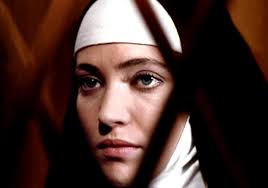STUDIO: Kino Lorber | DIRECTOR: Jacques Rivette | CAST: Anna Karina, Liselotte Pulver, Micheline Presle, Francine Bergé, Francisco Rabal
RELEASE DATE: 5/28/19 | PRICE: DVD $13.19, Blu-ray $19.69
BONUSES: Featurette “Suzanne Simonin, La Scandaleuse,” audio commentary by critic Nick Pinkerton
SPECS: NR | 140 min. | Foreign language drama | 1.85:1 widescreen | 2.0 mono | French with English subtitles
A subject of major controversy in France when it was first released, The Nun will hardly raise an eyebrow today. Its depiction of a young woman who serves in two vastly different convents does, however, demonstrate that Anna Karina (Band of Outsiders) was a fine actress outside of the work of Godard (La Chinoise) and that New Wave filmmaker (and theater obsessive) Jacques Rivette (Out 1, Around a Small Mountain) was a master at crafting a “filmed play” that was also cleverly cinematic.
The 1965 film was based on a 1780 novel by Diderot that had been mounted in 1963 in Paris with Karina in the lead role. Rivette chose to adapt it as his second feature and produced a more emotional, anguished version of the spiritual films made by New Wave favorites like Bresson (L’argent) and Dreyer (Vampyr).
The film was declared blasphemous, as it focused on the long-gone practice in which young women were basically “sold” into becoming nuns by their parents. Here, Suzanne Simonin (Karina) is guilted by her mother into joining the nunnery for purely financial reasons. (Suzanne is illegitimate, and her mother claims the family has no money to supply a dowry for her.)
Suzanne is first sent to a strict convent where the mother superior (Francine Bergé, Judex) torments her for trying to leave the order. She appeals to a lawyer, which lands her in a completely different situation: a convent where nuns act giddy and girlish and are overseen by a mother superior (Liselotte Pulver) who quickly develops a romantic attraction for Suzanne.
As it stands, The Nun works on two different levels. The first is as a fictionalized chronicle (based, however, on a real nun and a mother superior, as noted in a brief prologue to the film) of a young woman attempting to liberate herself from social constraints that allow her no say in her own fate – each time she escapes a bad situation, it’s because an influential man steps in and helps her out. In this regard, one marvels at Karina’s moving portrayal of a victim of emotional and physical abuse by other women.
The other level on which the film can be appreciated is as an intense melodrama that counterpoints two female communities that qualify as sororities of a sort – the first being a society of “mean girls” and the second being a playful club where the nuns act like pubescent girls (that happens to be run by a woman who can’t control her libido).
The latter aspect certainly makes the film compulsively watchable, and offers the viewer a “release” from the sadistic sequences, although the film is anything but optimistic. Rivette maintains a sincere tone throughout, but fans of women’s prison pictures will recognize that he made a more spare and beautifully constructed version of a picture like Caged (1950).
Although every element in The Nun bespeaks “high art,” one can’t help noticing that the “mean” sequences are extra mean (in the style of German Expressionist cinema or Dreyer’s The Passion of Joan of Arc) and the scenes set in the “giddy” convent are performed at a much sunnier register (where the women seem deranged with joy, and jealousy that Suzanne became the “favorite” of the mother superior so quickly). In this way one could easily say that The Nun opened the door for the “nunsploitation” movies that were made in the Seventies.
The controversy surrounding the film is recounted in a featurette by Dominique Maillet included in the release. Georges Kiejman, an associate of producer Georges de Beauregard, notes that the films was banned by minister of culture Andre Malraux, reportedly because a group of nuns visited Madame de Gaulle and asked her to take action against the picture. A groundswell of support for the film appeared, with numerous authors, filmmakers and actors speaking out against the ban, resulting in a petition with 1789 signatures (a number chosen to evoke French history).
The ban was lifted after a few months and a struggle to get a distribution visa began. The film was accepted by Cannes and went on to do quite well at the box office in France. Kiejman notes that the ban and attendant publicity made the public curious, and so an excellent film found a much bigger audience. (This is borne out by the fact that the 2013 adaptation of the Diderot novel starring The Piano Teacher‘s Isabelle Huppert as the lesbian mother superior did only moderate business.)
Karina mentions in the featurette that the cast and crew of The Nun were “totally shocked” at the ban. She discusses the ’63 stage production, which was also directed by Rivette, and maintains that she found out many years after it was over that it was secretly financed by her then-husband, Jean-Luc Godard.
One voice that is not represented in the package is that of Rivette (who died in 2016 but was interviewed many times about his films). As it stands, the most we learn about Rivette is (from Karina) that he was “meticulous” in his direction, using a lens that required he keep a distance from the performers (thus denying them much-desired close-ups), and (from Kiejman) that he was “annoyed” that the blasphemy charge overwhelmed press coverage of the film, even after the ban had been lifted.
|
Buy or Rent The Nun (1965)
|
|---|

Leave a Reply